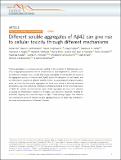Different soluble aggregates of Aβ42 can give rise to cellular toxicity through different mechanisms
Abstract
Protein aggregation is a complex process resulting in the formation of heterogeneous mixtures of aggregate populations that are closely linked to neurodegenerative conditions, such as Alzheimer's disease. Here, we find that soluble aggregates formed at different stages of the aggregation process of amyloid beta (Aβ42) induce the disruption of lipid bilayers and an inflammatory response to different extents. Further, by using gradient ultracentrifugation assay, we show that the smaller aggregates are those most potent at inducing membrane permeability and most effectively inhibited by antibodies binding to the C-terminal region of Aβ42. By contrast, we find that the larger soluble aggregates are those most effective at causing an inflammatory response in microglia cells and more effectively inhibited by antibodies targeting the N-terminal region of Aβ42. These findings suggest that different toxic mechanisms driven by different soluble aggregated species of Aβ42 may contribute to the onset and progression of Alzheimer's disease.
Citation
De , S , Wirthensohn , D C , Flagmeier , P , Hughes , C , Aprile , F A , Ruggeri , F S , Whiten , D R , Emin , D , Xia , Z , Varela , J A , Sormanni , P , Kundel , F , Knowles , T P J , Dobson , C M , Bryant , C , Vendruscolo , M & Klenerman , D 2019 , ' Different soluble aggregates of Aβ42 can give rise to cellular toxicity through different mechanisms ' , Nature Communications , vol. 10 , 1541 . https://doi.org/10.1038/s41467-019-09477-3
Publication
Nature Communications
Status
Peer reviewed
ISSN
2041-1723Type
Journal article
Description
Funding: This study is supported by the Marie-Curie Individual Fellowship programme (to S.D.), EPSRC Studentship (to D.C.W.), Boehringer Ingelheim Fonds (to P.F.), Studienstiftung des deutschen Volkes (to P.F.), Senior Research Fellowship from the Alzheimer’s Society, Grant Number 317, AS-SF-16-003, UK (to F.A.A), Swiss National Fondation for Science and Darwin College grant number P2ELP2_162116 and P300P2_171219 (to F.S.R.), Borysiewicz Biomedical Fellowship from the University of Cambridge (to P.S), the UK Biotechnology and Biochemical Sciences Research Council (to C.M.D.); the Wellcome Trust (to C.M.D), the Cambridge Centre for Misfolding Diseases (to P.F., F.A.A., P.S.,C.M.D., and M.V.) and the European Research Council Grant Number 669237 (to D.K.) and the Royal Society (to D.K.).Collections
Items in the St Andrews Research Repository are protected by copyright, with all rights reserved, unless otherwise indicated.

